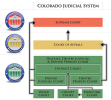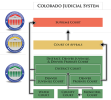Is Small Claims Court Right for You?
Can you get what you want?
The Small Claims Court is a "court of limited jurisdiction." This means that the court cannot award more than $7,500, even if your claim is worth more. You will have to waive your right to the amount that exceeds
$7,500, or you will have to bring your claim in a different court. You may also be entitled to recover your filing
fee, service of process fee and interest.
In addition, the Small Claims Court can only handle certain kinds of claims. Basically, these are simple cases to recover money or property, perform a contract, set aside a contract, or comply with restrictive covenants.
For example, a dispute between a landlord and tenant over the return of a security deposit can properly be
brought in Small Claims Court. So can a case involving a car accident, where insurance did not cover the
damages to a car.
You cannot have a jury trial in Small Claims Court. Under Colorado Revised Statute (C.R.S.) § 13-6-405(4),
all claims are heard by a Magistrate, unless one of the parties timely requests that a Judge hear the case or
unless that particular court location does not have a Magistrate. The Small Claims Court cannot hear cases
of libel or slander, eviction, traffic violations, or criminal matters.
For a full list of prohibited claims, see C.R.S.
§ 13-6-403.
There are some things the Small Claims Magistrate (or Judge) cannot do, even if you win. The Magistrate
cannot order someone to stop calling you at 3 a.m. in the morning or saying bad things about you in public. If
you need help of this kind, then you should not be in Small Claims Court.
Who can you sue in Small Claims Court?
The party you are suing in Small Claims Court must meet one of the following qualifications to be sued in
the County in which the Small Claims Court is located: The Defendant must either: (1) live in the County; (2)
be a full- time student in the County; (3) be regularly employed in the County; (4) have a regular place of
business in the County; or (5) be the Landlord in a claim concerning a security deposit paid by the Plaintiff to
rent property located in the County. If the Defendant does not meet one of these qualifications, you cannot
use the Small Claims Court in that County, but a different court either in the same County or in a different County may have jurisdiction to hear your case.
Can you get organized? Can you think on your feet?
If you take your case to Small Claims Court, you have to be able to tell the Magistrate your story so that he
or she understands why you are entitled to prevail in your case.
You also have to be able to answer questions from the Magistrate or the other side. Before you go to Small Claims Court, you will need to gather evidence to present your claim, like a contract, pictures, or a set of bills.
Can you speak in public? If you go to Small Claims Court, you will have to make a public presentation with
people watching you.
Can you think and speak when you are feeling stressed? You will have to try and remain calm even with your opponent there, who you may think is lying about you and the situation.
If you cannot do this, you should not be in Small Claims Court.
https://www.coloradojudicial.gov/sites/default/files/2023-07/JDF248.pdf
https://www.courts.state.co.us/userfiles/file/Self_Help/smallclaimshandbook finaltocourt 4-11.pdf

